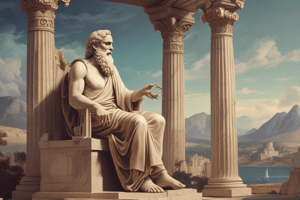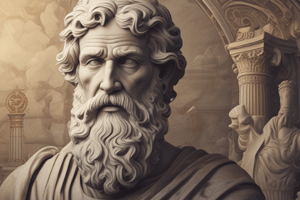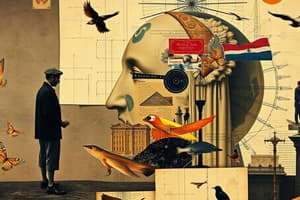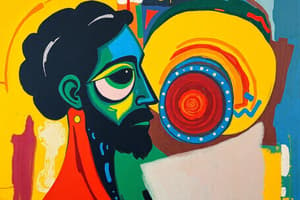Podcast
Questions and Answers
Which of the following concepts is associated with Plato's philosophy of the self?
Which of the following concepts is associated with Plato's philosophy of the self?
- Dualism (correct)
- Behaviorism
- Naturalism
- Materialism
What are the three components of the soul according to Plato?
What are the three components of the soul according to Plato?
- Will, desire, intellect
- Rationality, desire, consciousness
- Reason, emotion, will
- Reason, physical appetite, spirit (correct)
What does Socrates believe the essence of the self is?
What does Socrates believe the essence of the self is?
- The body
- The physical form
- The mind
- The immortal soul (correct)
What is the primary purpose of the Socratic method?
What is the primary purpose of the Socratic method?
How does the physical realm affect the quest for wisdom according to Socrates?
How does the physical realm affect the quest for wisdom according to Socrates?
What does the spirit or passion component of the soul include?
What does the spirit or passion component of the soul include?
According to Plato, what enables humans to think deeply and make wise choices?
According to Plato, what enables humans to think deeply and make wise choices?
What does man need to achieve a meaningful and happy life according to Socratic philosophy?
What does man need to achieve a meaningful and happy life according to Socratic philosophy?
What is the primary focus of the Id during infancy?
What is the primary focus of the Id during infancy?
During which stage does the baby begin to show signs of socialization?
During which stage does the baby begin to show signs of socialization?
What marks the transition from infancy to babyhood?
What marks the transition from infancy to babyhood?
What is the role of the Ego in relation to the Id?
What is the role of the Ego in relation to the Id?
What is the age range typically associated with the early childhood stage?
What is the age range typically associated with the early childhood stage?
What does the Idealistic Principle represent in Freud's model?
What does the Idealistic Principle represent in Freud's model?
How does happiness typically manifest during early childhood according to Freud?
How does happiness typically manifest during early childhood according to Freud?
What is marked by increased independence and individuality?
What is marked by increased independence and individuality?
What is the primary task of a philosopher according to Socrates?
What is the primary task of a philosopher according to Socrates?
How is genuine happiness achieved according to the content?
How is genuine happiness achieved according to the content?
Which of the following describes Aristotle's view on the self?
Which of the following describes Aristotle's view on the self?
What is the relationship between the world of forms and the sensible world?
What is the relationship between the world of forms and the sensible world?
What does Aristotle suggest leads to a good, flourishing life?
What does Aristotle suggest leads to a good, flourishing life?
According to the content, what should man give more importance to?
According to the content, what should man give more importance to?
How does Plato's concept of justice relate to nature?
How does Plato's concept of justice relate to nature?
What does Aristotle classify as the three kinds of souls?
What does Aristotle classify as the three kinds of souls?
What is the primary characteristic of middle age?
What is the primary characteristic of middle age?
At what age does old age typically begin according to the content?
At what age does old age typically begin according to the content?
What challenges are commonly faced during old age?
What challenges are commonly faced during old age?
Which concept refers to an individual becoming stuck at a specific stage of development?
Which concept refers to an individual becoming stuck at a specific stage of development?
Which statement best describes the global self?
Which statement best describes the global self?
What is indicated by the differentiated self?
What is indicated by the differentiated self?
What is a common perception about old age as mentioned in the content?
What is a common perception about old age as mentioned in the content?
How is the self constructed according to the content?
How is the self constructed according to the content?
What does Laozi's quote suggest about attempting to change the universe?
What does Laozi's quote suggest about attempting to change the universe?
In Jainism, what is the purpose of following non-violence, truth, and self-discipline?
In Jainism, what is the purpose of following non-violence, truth, and self-discipline?
What role do Jain believers recognize instead of deities?
What role do Jain believers recognize instead of deities?
Which of the following correctly describes the Hindu trinity?
Which of the following correctly describes the Hindu trinity?
What is the ultimate goal in Hinduism regarding the self (Atman)?
What is the ultimate goal in Hinduism regarding the self (Atman)?
In the context of Shintoism, what are kami?
In the context of Shintoism, what are kami?
How is karma conceptualized in Jainism?
How is karma conceptualized in Jainism?
Which aspect of personal identity is emphasized in Western cultures compared to Eastern philosophies?
Which aspect of personal identity is emphasized in Western cultures compared to Eastern philosophies?
Flashcards are hidden until you start studying
Study Notes
Philosophy of the Self
- Socrates posits that the essence of the self is the immortal soul, striving for wisdom and perfection.
- He advocates for an examined life filled with purpose and virtue, believing happiness arises from self-knowledge and virtuous living.
- Plato, a student of Socrates, introduces the three-part soul: reason, physical appetite, and spirit, emphasizing reason as the essence of justice.
- The essence of the soul transcends physical existence, leading to an inherent duality of body and soul throughout philosophical discourse.
Aristotle's Theory of the Soul
- Aristotle categorizes souls into three types: vegetative (growth), sentient (sensory experiences), and rational (intellectual capacity), unique to humans.
- His Theory of Forms distinguishes between the real world of forms and the impermanent sensory world, suggesting the ideal world influences reality.
- Emphasis on rationality as essential for achieving a fulfilling life, underscoring the pursuit of happiness through virtuous action.
Stages of Human Development
- Infancy (0-1 year): Characterized by immediate gratification and the pleasure principle, focusing solely on satisfaction without social consideration.
- Babyhood (2 weeks to 2 years): Marked by significant physical and intellectual growth, socialization begins as children seek connection beyond primary caregivers.
- Early Childhood (2-6 years): Children develop skills and personality via parental acceptance, transitioning to a more socially aware self.
Middle Age and Old Age
- Middle Age: A transition between adulthood and old age, starting around 45, showcasing personal achievements and societal roles.
- Old Age: Begins around 65, marked by physical decline and adjustment challenges, often associated with disability and social withdrawal.
Freud's Concepts of the Self
- The Id operates on the pleasure principle, seeking immediate satisfaction without regard for social norms, and is present from birth.
- The Ego works to fulfill Id's demands in socially acceptable ways, becoming the decision-making aspect of personality.
Global Self vs. Differentiated Self
- The concept of self is dynamic and influenced by individual experiences and thoughts, evolving continuously rather than being fixed.
- Global Self: A unified self-concept where a person behaves consistently across different social contexts.
- Differentiated Self: Emphasizes adaptability, allowing for a fluid identity shaped by interactions and self-reflection.
Religious Perspectives on the Self
- Hinduism: Features deities like Brahma (creator), Vishnu (preserver), and Shiva (destroyer), focusing on self-realization and the purification of the soul (Atman) through knowledge and discipline.
- Jainism: Rejects belief in gods but acknowledges a higher power, emphasizing non-violence and self-discipline to cleanse the soul from negative karma.
- Shintoism: Recognizes kami (gods) in the natural world, linking spirituality to nature and cultural identity.
Philosophical Insights
- Laozi highlights the importance of acceptance and flow in life, suggesting that striving to control or change leads to chaos.
- Both Western and Eastern philosophies explore identity formation within socio-cultural contexts, emphasizing personal and universal interconnectivity.
Studying That Suits You
Use AI to generate personalized quizzes and flashcards to suit your learning preferences.




